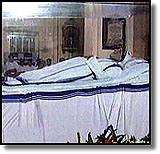
|
|
|
India Declares Day of State Mourning for Mother TeresaThe Indian government has declared a day of state mourning for the missionary nun, Mother Teresa, who died on Friday. She was 87.The government said her funeral in Calcutta next Saturday would be given the status of a state occasion -- an honour normally reserved for India's highest political leaders. Thousands of people gathered in heavy rain on Saturday outside the headquarters of the Roman Catholic order founded by Mother Teresa nearly 50 years ago to help the poorest of Calcutta's poor. The steady rain for much of the day reflected the sombre mood outside the Mother House, as the headquarters of the Missionaries of Charity is known. The crowd of mourners was of all ages and, very obviously, of all social backgrounds. Some came with banners; one simply read: Mother Teresa - as if that said it all. Another said of the nun who started orpanages around the world: Calcutta had now itself been orphaned with her death. The Indian Government says protocol will be set aside for the funeral of Mother Teresa to have the status of a state funeral. What this will mean in terms of the form of the funeral is yet to be seen.
The World Pays Tribute"An extraordinary example of this silent mission of charity, which is born from the contemplation of Christ, is Mother Teresa of Calcutta, who returned to the Home of the Father just yesterday," the Pope said in a speech to the Italian Centre of Volunteers of the Suffering. The decision to hold a state funeral came as a surprise in tradition-bound India, which had already given Mother Teresa its highest honour, Bharat Ratan, in 1980 -- one year after she won the Nobel Peace Prize.
Flags flew at half mast throughout India on Saturday. The prime minister planned to travel to Calcutta on Sunday to pay his respects, and Narayanan was set to attend the funeral. In Britain, the head of the Roman Catholic church in England and Wales, Cardinal Basil Hume, said Mother Teresa had been a unique example of genuine holiness. Ordinary people around the world, he said, had been inspired by her unshakeable trust in God, her absolute commitment to the poor, and the strength of her love and humanity.
The British Prime Minister, Tony Blair, said that in a week already filled with tragedy, the world would be saddened that one of its most compassionate servants had died. Mother Teresa's spirit, he said, will live on as an inspiration to all of us. President Clinton described her as an incredible person. Mother Teresa had become increasingly frail in recent years, though she surprised everyone by undertaking a trip to Europe and the United States only three months ago, providing her with what has now turned out to be a last chance to meet the Pope. Her death came swiftly, shortly after she had complained of chest pains and doctors had been summoned urgently to the mother house.
Mother Teresa was born of Albanian parents 87 years ago. When she was 18 she joined a community of Irish nuns and went to their mission in Calcutta in 1929. Just over twenty years later she founded the Missionaries of Charity -- which over the succeeding years established hundreds of orphanages, homes for the poor and other charity centres around the world.
Mother Teresa was not without her critics. Some doctors accused her of providing haphazard medical care and not using basic medicines, like painkillers. Writing in the leading medical journal The Lancet in 1994, Dr Robin Fox commented: "Mother Teresa prefers providence to planning". In the same year, a British documentary - controversially entitled "Hell's Angel" - charged that she urged the poor to accept their fate, portraying the rich as favoured by God. Journalist Christopher Hitchens, who wrote the script, remarked: "She lends spiritual solace to dictators and to wealthy exploiters...and preaches surrender and prostration to the poor." In 1979 she was awarded the Nobel Peace Prize, one of many honours bestowed on her. She said simply that she had a special calling to help the poorest of the poor.
|
Diana, Princess of Wales, 1961-1997
Conference 97
Devolution
The Archive
News |
Issues |
Background |
Parties |
Analysis |
TV/Radio/Web
Interactive |
Forum |
Live |
About This Site
News |
Issues |
Background |
Parties |
Analysis |
TV/Radio/Web
Interactive |
Forum |
Live |
About This Site
© BBC 1997 |
politics97@bbc.co.uk |



